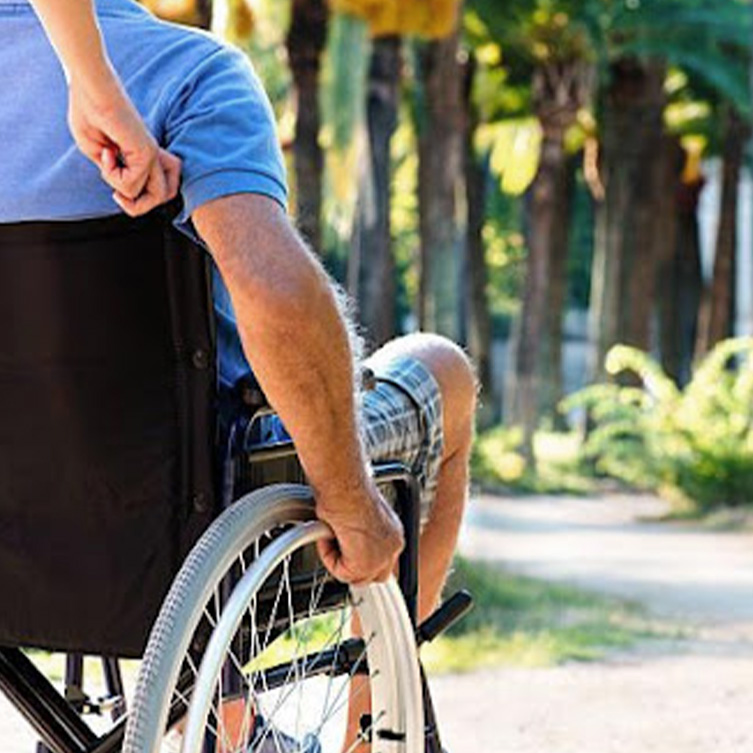Mobility Solutions for Patients with Multiple Sclerosis in Houston
Multiple Sclerosis is a disease that effects the central nervous system and disrupts the flow of information between the brain and the rest of the body. While the exact cause of MS is unknown, it is known that something causes the immune system to begin attacking the brain and the spinal cord. Contact us for more information

Helpful Products
Multiple Sclerosis causes many different symptoms including: vision loss, pain, fatigue, and impaired coordination. The symptoms, the severity of each, and duration vary from person to person. Some patients can live completely symptom free most of their lives, while others have severe chronic pain that never goes away.
During a study of approximately 1,075 patients living with relapsing-remitting MS*42% of participants reported that their ability to perform and manage daily activities was limited. More than 50% reported limitations in daily activities due to fatigue, physical weakness, problems with balance/coordination, heat/cold sensitivity, memory problems, numbness/tingling, trouble concentrating, impaired movement/muscle stiffness, and impaired sleeping.
There are 4 stages of Multiple Sclerosis. Stage 1 includes recognizing that something isn’t right and visiting the doctor. This results in the diagnosis of MS.
The second stage involves learning to live with disease and processing the changes that it brings. Fatigue and balance issues can start to occur.
The third stage is where the patient begins to have moderate disabilities. In this phase, patients tend to start to need help with daily living activities, such as preparing meals, bathing, and dressing themselves.
The fourth, and final, stage of MS can involve increasingly severe debilitation. The patient may have difficulty speaking and may suffer from an involuntary rapid movement of the eyes. Muscle weakness and atrophy eventually cause the patient to lose the ability to walk or stand on their own. Difficulty swallowing may result in a feeding tube being placed. Daily living activities now are very difficult and usually have to be done by a caregiver.
LiveWell has a wide range of mobility products that can support independent living for patients with Multiple Sclerosis.
LiveWell Products that can assist with Activities of Daily Living:
Bathroom remodeling to include a zero-entry shower, grab bars, and wheelchair accessible vanities
- While symptoms from MS may not show right away, it’s best to plan for what could potentially come in the future. Modifications to the bathroom will be important to both the patient and the caregivers. Installing a raised toilet seat with arms can make it easier to use the restroom once muscle weakness begins. A zero-entry shower that has no threshold is very helpful because it removes any tripping hazard. Wheelchairs can also be rolled into the shower allowing for a shorter distance of transferring the patient once they are no longer able to walk. Wheelchair accessible vanities can be installed that allow for the wheelchair to roll underneath and the patient is able to safely use the sink without leaving their chair.
Grab Bars
- Patients can begin to experience muscle weakness even in the second and third stages of MS. Grab bars are critical in these stages of the disease. Grab bars help to sustain balance and prevent falls and injuries and should be installed in the shower and beside toilets. Standing grab bars are a great solution beside beds and when there are glass shower doors and no good location for mounting a traditional grab bar.
Stairlifts
- Living with MS in a home with stairs can be very difficult. Oftentimes, certain areas of the home become off limits because they simply aren’t accessible. Navigating the stairs and maintaining accessibility to all rooms of the home does not have to be a difficult process. Adding a stairlift to the home removes any mobility barriers for a patient living with MS that is still able to walk on their own. The stairlift moves on a track up and down the stairs. The seat has a seatbelt and is controlled by a device on the arm rest.
In-home elevator
- When a patient with MS is struggling to walk on their own or is now dependent on assistive devices, it may be time to consider adding an in-home elevator. There are several types of elevators that can be used. Standard residential elevators require a pit and an elevator shaft. LiveWell’s innovative through-the-floor home lifts require no elevator shaft and can be freestanding. An inclined or vertical platform lift is perfect for accessibility for wheelchair users. Vertical platform lifts can be used indoor or outdoor and have an open platform. They take up less space than a ramp.
Doorway Widening
- A lot of times, people never stop to consider their doorways when they are considering making accessibility modifications. It is so important to consider the size of the patient’s assistive devices when thinking about expanding the doorways in the home. The standard size of an interior door ranges from 22 to 30 inches. The minimum recommended door width for those with assistive equipment that will need to pass through it is 36 inches.
Ramps
- As MS progresses and the patient has a harder time walking or is confined to a wheelchair, entering and exiting may become a problem if there are stairs or uneven, rough terrain. A ramp can remove any barriers to entry and provide a safer way to enter and exit. Ramps come in all shapes and sizes and are custom fitted to the home. They can be made out of wood or metal, depending on the patient’s needs.
Lift Chairs
- Lift Chairs are used for patients in the middle to final stages of MS who struggle to raise and lower themselves from a seated position without help. They ensure that patients can sit and stand in a safe, controlled manner without a caregiver’s help to reduce the risk of falls or related injuries. This also helps to enhance the patient’s sense of independence and normalcy as long as possible. The comfort and safety aspect of the chair allows for patients to be comfortable while maximizing pain relief.
- Not only are lift chairs a great addition with many benefits for the patient in the final stages of MS, it’s also great for the caregivers as well. This reduces the need to help someone in and out of a chair. It also provides caregiver peace of mind knowing that the risk of injury to the user from standing and sitting is minimized.
Power Scooters or Chairs
- Leading an active life for as long as possible is of the utmost importance for patients with MS, and power scooters can help them do just that in a safe and stress-free way. Power scooters are battery powered mobility devices that allow patients to travel to places without having to walk or, if close by, drive. Vehicle lifts or hitch-mounted lifts can be used to transport the power scooter or chair wherever needed.
- There are a variety of power scooters available and the type needed is based on various factors: where and how patients plan on using their scooter, specific mobility needs, and budget.
While there is no cure for Multiple Sclerosis, LiveWell and our wide variety of products can help to ensure that mobility isn’t an issue. Our products and services can make any room in the home safer and more accessible for those that are battling MS. Contact us today to schedule a free in-home consultation. Our team of experts can evaluate the home and provide a thorough proposal of all available options. Click here to contact us for more information.
*Survey Results by Ann D. Bass, MD, Bart Van Wijmeersch, MD, PhD, and Barry Singer, MD. Full Article can be found on the International Journal of MS Care website.


